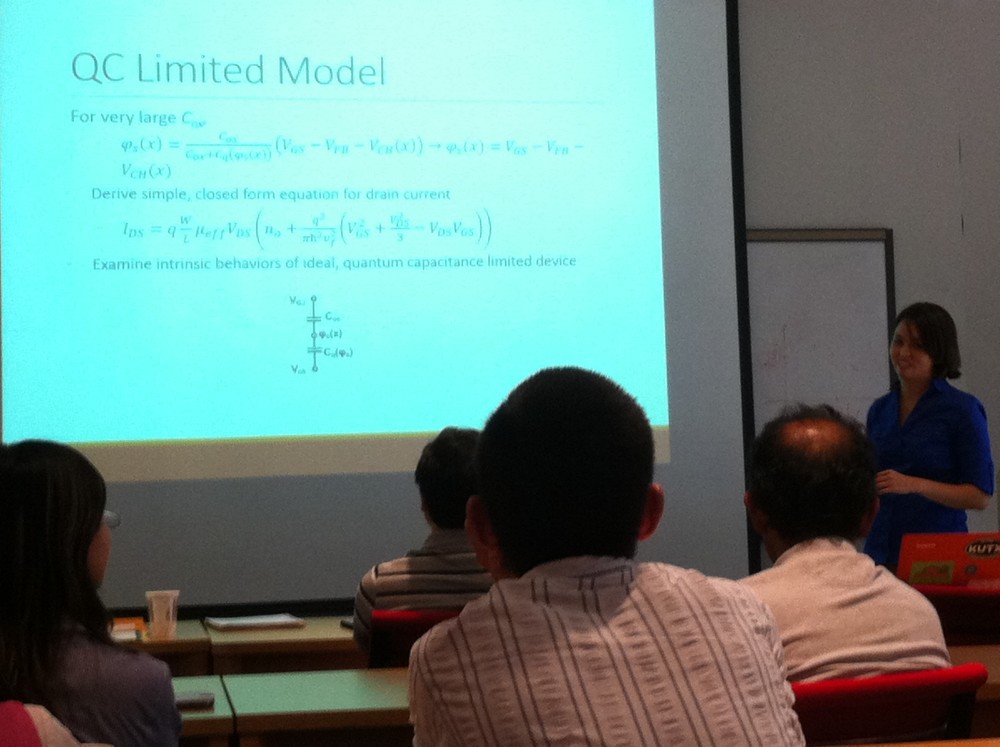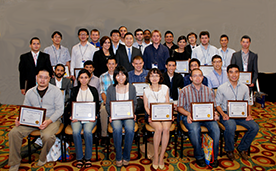The two experimental papers report state of the art flexible graphene and MoS2 devices, and recovery of the intrinsic properties of 2D materials based on favorable fluoropolymer interactions.
Author Archives: jh2758
MIT Technology Review reports on record 25GHz flexible water-resilient graphene transistors
Congratulations to Kristen Parrish for defense of her Ph.D dissertation. Dr. Parrish will be joining TI Kilby Labs.
(ACS Nano) Flexible MoS2 transistor research highlighted on nanotechweb
“Researchers at the University of Texas at Austin and the University of Notre Dame, Indiana, both in the US, are the first to have succeeded in making high-performance molybdenite transistors on plastic substrates. The feat, hitherto deemed too difficult, means that the material might be ideal for making high-speed and low-power flexible electronics devices.”
SPIE Newsroom invited feature on Monolithic Graphene-Si VLSI Technology
 SPIE Newsroom publishes Prof. Akinwande’s article, entitled “Integrating wafer-scalable graphene with ubiquitous silicon technology“. The article describes how the synthesis of nearly defect-free monolayer graphene can be combined with silicon technology in order to create innovative next-generation electronic and optical systems and sensor devices.
SPIE Newsroom publishes Prof. Akinwande’s article, entitled “Integrating wafer-scalable graphene with ubiquitous silicon technology“. The article describes how the synthesis of nearly defect-free monolayer graphene can be combined with silicon technology in order to create innovative next-generation electronic and optical systems and sensor devices.
(Nanoletters) Improved graphene transfer and post-transfer restoration article featured on nanotechweb
Improved transfer tactics make better graphene devices
Polymer residues on graphene – routinely left behind after the material is transferred to dielectric substrates like SiO2 – adversely affect its electronic properties. Now, a team of researchers at the University of Texas at Austin has found that using lower concentrations of polymer solution during the transfer process is better, and results in less p-type doping in the carbon material. Treating the graphene surface with a chemical called formamide also temporarily enhances the electronic properties of graphene. The findings will help in making improved, high-performance carbon-based devices in the future.
Spring/Summer schedule of invited talks includes MRS, SPIE, ECS, TechConnect World, CMOSET, and INFOS conferences in addition to invited lecture at Stanford University
Prof. Akinwande has been elevated to the Senior Membership level of IEEE.
Flexible graphene device selected among the “Best of 2012” technical news stories
Our research on state-of-the-art flexible graphene electronics was honored as a key technical news story of 2012. More information is available at nanotechweb.org.
Dr. Akinwande gives plenary talk
Dr. Akinwande gives plenary talk on “Flexible Nanomaterials and Nanotechnology” at Nano MTY 2012
Two students earn TechCon “Best in Session” awards
Prof. Akinwande honored with the IEEE Nano “Geim and Novoselov Prize”
Dr. Akinwande wins the inaugural Geim and Novoselov Prize.
UT ECE professor Deji Akinwande has been
awarded the first Geim and Novoselov Graphene Prize during the gala dinner at the IEEE nano conference in Birmingham, UK. The award recognizes Deji’s work on ” flexible multifinger graphene device technology” and in particular his pioneering effort on graphene transistors for high speed high frequency flexible nano electronics. Graphene transistors on flexible substrates could enable future flexible smart systems. The prize is named in honor of the 2010 Nobel laureates for graphene discovery.
Dr. Deji Akinwande is an Assistant Professor in the Department of Electrical and Computer Engineering at The University of Texas at Austin. Professor Akinwande joined UT Austin starting from January 2010, and he is a member of IEEE, APS, ACS, and MRS societies.
Graphene research featured on Physics World
Our research on graphene CVD growth and device studies featured in the August 2012 issue of Physics World
Wafer-Scale Graphene CVD Growth
Our research on high-quality graphene growth using copper film on oxidized Si is profiled at several sources. The quality of the wafer-scale CVD graphene is comparable to exfoliated natural flakes. Links at Aixtron, Graphene-Info, and electro-IQ.


 Dr. Parrish defending her Ph.D dissertation. Good luck for your future endeavors at Texas Instruments Kilby Lab
Dr. Parrish defending her Ph.D dissertation. Good luck for your future endeavors at Texas Instruments Kilby Lab
